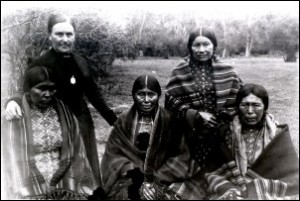
Presbyterian Missionary Kate McBeth and Nez Perce Students, late 19th Century, courtesy Idaho Historical Society
Besides encouraging native peoples to take up farming, white settlers believed that introducing Christianity would help “civilize” Indians (see last post). Federal policy encouraged missionaries to enter Indian territories to spread both the gospel and white culture. By the 1820s, missionaries were active as far west as Oklahoma, and by the 1850s, had established churches, schools, and mission stations among the Cherokee, Comanche, Choctaw, Chickasaw, and many other native peoples. The government did not always observe a strict separation of church and state, since they considered Christian missionaries effective ambassadors of white culture, and actively encouraged their involvement in reservation life. In 1869, federal officials instituted the Peace Policy, a church-led assimilation program based out of reservations. These and similar efforts fell in line with the prevailing notion that America held a unique position in the world because of its Christian, democratic roots, and needed to spread its ideals across the continent.
For the most part, missionaries were undoubtedly convinced that their work would better both the physical and spiritual lives of Indians, and Native Americans did not always reject Christianity out of hand. Various Native American belief systems held commonalities with Christianity, and Native Americans tended to be spiritually inclusive. As a result, they could accept appealing parts of Christianity without rejecting their own traditional belief systems. In unfortunate contrast, Christian missionaries wanted Native Americans to abandon their heritage and culture completely. This adversarial stance guaranteed that Native Americans would suffer almost continually for practicing their own religion.
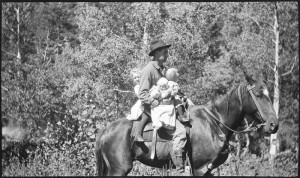
Reverend Arthur on Horseback With His Three Children, courtesy Smithsonian National Museum of the American Indian
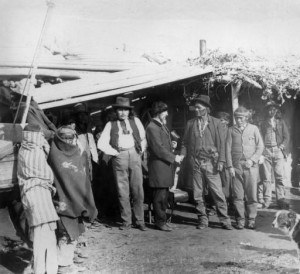
Chief Black Horse Shaking Hands With Missionary, Promising Friendship, between 1880 and 1910, courtesy Library of Congress
______________________________________________________________________________________

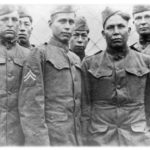
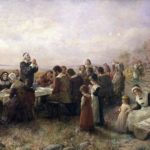
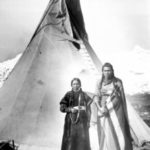
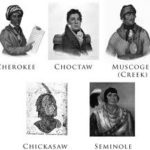
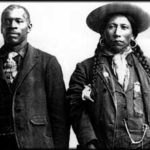
Thank you so much for the information–I appreciate it. I am working on a new project right now, but I will definitely keep your suggestion in mind.
Best regards,
Carla
Hello. I ran across your post while looking for pictures of Black Horse. Good news for me is that you have a very nice one. Thank you. Ironically, however, your picture is of Bilį́į́’ Łizhini, the Navajo headman “Black Horse.” He is clearly recognizable, but also wearing the traditional Navajo men’s necklace. There’s a fascinating book you might enjoy called The Trouble at Round Rock, written by Left-Handed Mexican Clansman in 1952. Bilį́į́’ Łizhini plays a central role. If you aren’t familiar with the book, I think it would fit well with your writing and research. Take care.
Spiritual life is quite unique because it embodies a life that is free from being to materialistic. ;’.;,
Kindest regards
http://www.healthmedicinelab.com“>
Thank you so much–I appreciate the encouragement.
Thank you Carla – I am so happy I found your blog. It is always informative and brings to light the truth about our past. It is important in our times to share all we can that helps others understand that history we are taught is not always accurate, as it often portrays what is desired in terms of impact and perception of the student/reader, instead of actual fact.
Sadly, so much of what people know today is not “real” in the sense of true history. It is myth built upon tales of conquest and conversion, giving a biased slant to those who are “writing” the history… “to the victors goes the spoils” as they say… the “winners” tell the tale.
Thank you once again – it is good to know the truth and it is good to educate others responsibly. We hope and pray that over time more people wake up and take action that will help re-balance the status quo and honor those who have not had a voice in the dominant culture.
My best to you and yours.